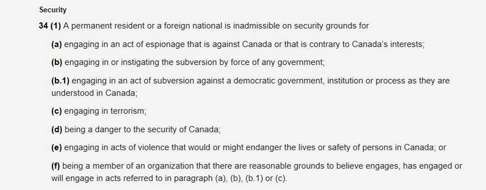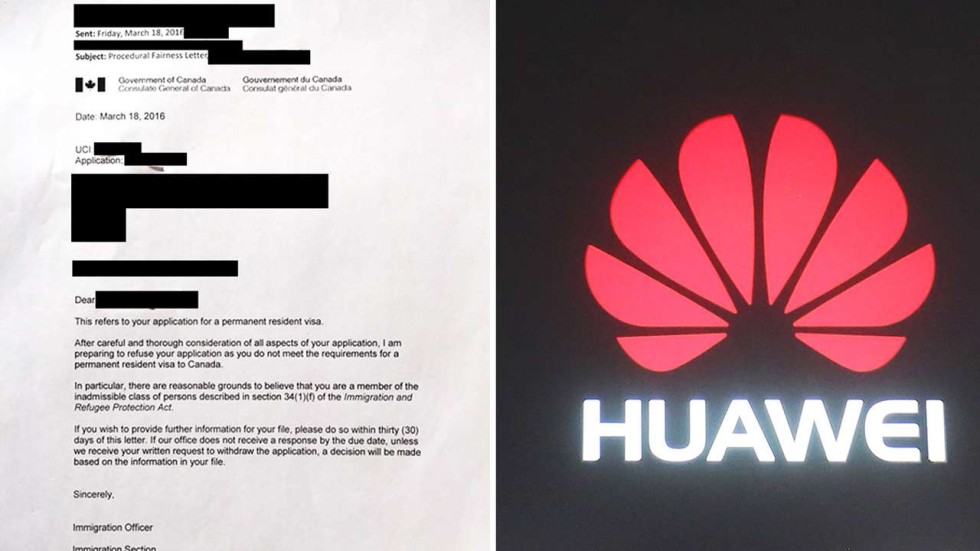Canada cites espionage risk from two Huawei employees, saying it plans to reject their immigration applications
Two employees face visa rejection in world-first targeting of telecom giant’s staff, but they categorically deny being spies, immigration consultant says
PUBLISHED : Wednesday, 04 May, 2016,
Canada is citing the risk of espionage as it prepares to reject the immigration applications of two Chinese employees of mainland telecom giant Huawei, in the first such cases to emerge amid a swirl of unsubstantiated international spying concerns about the firm.
In a letter obtained by the South China Morning Post, an immigration officer at Canada’s Hong Kong consulate told one applicant in March: “there are reasonable grounds to believe that you are a member of the inadmissible class of persons described in section 34(1)(f) of the Immigration and Refugee Protection Act.”
That refers to people who belong to an organisation engaged in espionage, government subversion or terrorism.
A second applicant was told last month that the same concern existed about their spouse, who was included in their immigration application.
“After careful and thorough consideration … I am preparing to refuse your application,” said both letters, which were provided to the SCMP by the applicants’ immigration consultants, Beijing-based Well Trend United.
Huawei , the world’s third-biggest smartphone maker and a major provider of global telecoms infrastructure, has long been cited by the United States as a Chinese espionage risk, but Well Trend’s clients are believed to be the first individuals singled out by any foreign government in such a way.Well Trend’s vice-president, Victor Lum, said the two Huawei staff “definitely and categorically” deny being spies.
Their unrelated applications were lodged separately more than two years ago, Lum said, but the so-called “procedural fairness” letters arrived within days of each other, on March 18 and March 21.
Huawei has repeatedly denied involvement in espionage.

But in 2012, a US House intelligence committee concluded Huawei was a threat to national security. The firm has been barred from bidding on US and Australian broadband projects.
By contrast, the company is deeply embedded in Canada’s market, providing network technology and equipment for major wireless operators, such as Bell and Telus.
SCMP has agreed not to identify the two employees, who work in low and mid-ranking non-executive positions. “Their respective job-description narratives could not be more mundane,” said Lum, who said he believed the immigration applications were lodged without Huawei’s knowledge.
“The only common thread is that they work for Huawei, the largest telecom equipment manufacturer in the world, with over 170,000 employees, and R and D institutes all over the world, including, ironically, Canada. What our clients find particularly galling is that they know of many former Huawei colleagues who have successfully immigrated to Canada.”
Lum – who spent 12 years as a Canadian visa officer, including three-year stints in Hong Kong and Beijing – said the rejection of immigration applicants on suspicion of espionage was exceedingly rare, and he had only heard of two or three such cases while working for Ottawa.

He said Well Trend had successfully handled dozens of visa applications by Huawei staff in recent years. “This is the first time we’ve seen Huawei employees singled out in this way,” Lum said, and the two applicants were “shocked and dismayed”. “The Canadian immigration process is lengthy, and to receive this kind of refusal at the eleventh hour, in the final stages of the process, it’s like being cut off at the knees within sight of the finish line,” Lum said.
The procedural fairness letters gave the applicants 30 days to respond. Objections were lodged in both cases ahead of the deadlines.
Hong Kong-based immigration lawyer Jean-Francois Harvey, whose Harvey Law Group focuses on Canadian immigration cases said: “I am very surprised by such action from CIC since I am not aware that this matter about Huawei was ever sustained in fact and in law. [However] the candidates being refused for such reasons still have a chance to be heard by CIC.”
We have a very defined process for [immigration] applications. There is nothing to indicate this has anything to do with us.
The Huawei employees both applied to immigrate under Canada’s provincial nominee programme, which allows provincial authorities to choose immigrants based on skills and experience. Lum said both applications passed provincial vetting, but the final say went to federal authorities and it was at this late stage they were red-flagged.
Scott Bradley, Huawei’s vice-president of corporate and government affairs in Canada, said he was unaware of the two cases, and had “no idea” of the identity of the employees.
“We have a very defined process for [immigration] applications,” Bradley said, referring to cases in which Huawei staff are transferred abroad. “There is nothing to indicate this has anything to do with us.”
A spokeswoman for Canada’s immigration department said it could not comment on individual cases. She said the onus was on applicants to prove they did not pose a threat to Canada’s security, and “all applications from around the world are assessed equally”.
Although neither the US nor Australian governments have provided evidence of spying by Huawei or its staff, the firm has been targeted by the US National Security Agency’s own hackers, according to classified documents leaked by NSA whistleblower Edward Snowden. The NSA broke into Huawei’s servers in Shenzhen and spied on its executives, the New York Times reported in 2014
In March, Huawei was given the all-clear in Britain by a board which concluded it posed no national security risk.


No comments:
Post a Comment
Comments always welcome!